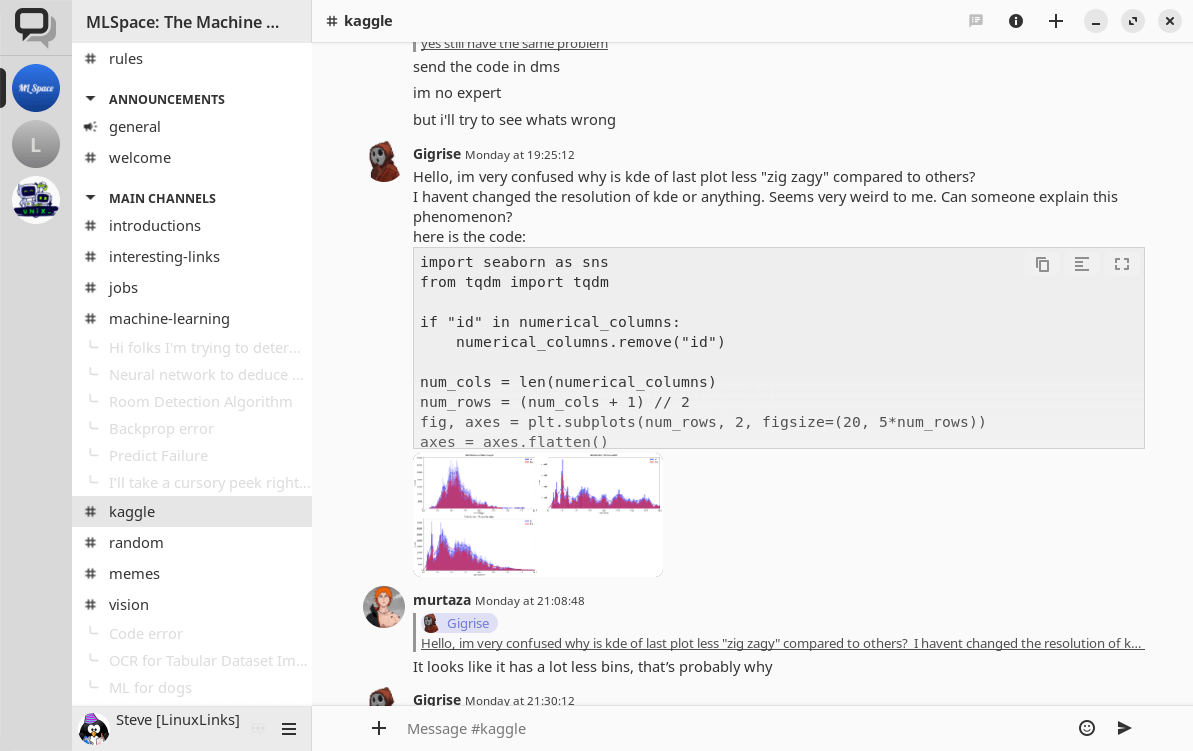In Operation
Here’s an image of Dissent in action.

Features include:
- Text chat with complete Markdown and custom emoji support.
- Guild folders and channel categories.
- Tabbed chat interface.
- Quick switcher for channels and servers.
- Image and file uploads, previews, and downloads.
- Integrated image viewer.
- User theming via custom CSS.
- Partial thread/forum support.
- Partial message reaction support.
- Partial AI summary support (provided by Discord).
- Channel summaries and Conversation summaries.
- Spell checking support using libspelling.
- Basic inline text spoiler.
- Cross-platform support – runs under Linux and Windows.
Summary
Dissent is a lightweight alternative to the official Discord client. According to the ps_mem utility (a very useful program which accurately reports memory usage of programs), Dissent’s memory footprint is much lower than the official client.
After performing a defined set of actions, the Discord client consumes 590MB of RAM, whereas Dissent uses only 277MB. We wouldn’t describe it as tiny though.
Of course, Dissent does not offer all the functionality. For example, it doesn’t support voice chat and some other advanced features. But if its functionality is sufficient, Dissent is definitely worth trying out for yourself. We like it and give it our recommendation although you should bear in mind that using this unofficial client is technically in breach of Discord’s Terms of Service.
At the time of writing, the project has gathered 1.2K of GitHub stars.
For other open source Discord clients, check out this roundup.
Website: github.com/diamondburned/dissent
Support:
Developer: diamongburned and contributors
License: GNU General Public License v3.0
Dissent is written in Go. Learn Go with our recommended free books and free tutorials.
Pages in this article:
Page 1 – Introduction and Installation
Page 2 – In Operation and Summary

I am not a proprietary-software supporter and so Discord is not my fancy.
However, I recognise that they have a right to decide their own Terms and Conditions.
If this software, Dissent, is in breach of those terms (and thus of the law), why are you advertising here?
We have so many valid opensource alternatives, and such a diverse ecosystem built on then. Starting from Matrix, for example. But also, albeit slightly different, Mastodon, Nostr etc etc.
It’s never clear cut Gio. Breaching terms of service is not necessarily a breach of a law. For example, in many countries failing to abide by terms of service does not give a company a right to enforce unreasonable terms.
The fact there are alternatives to Discord makes not a jot of difference if you need to access their service e.g. if a gaming community has chosen to use Discord.
The comment about ToS simply repeats the developer’s disclaimer.
A huge amount of benign open source software can be used for unlawful purposes. But that’s not a reason, in itself, to exclude them. And breaching an organization’s ToS is not automatically a breach of any law.
Users make their own decision whether to use a particular app or service.
Countries often ban services. Discord itself is banned in Oman, Iran, China, UAE and North Korea. Should we not cover a service because it’s illegal to use in a minority of countries?
Valid points Steve.
Getting caught using Discord in those countries probably results in a prison sentence. Probably worse in North Korea.
While a few countries ban Discord, that’s not a reason to exclude Discord from LinuxLinks. Some people hate services/software which is not open source. That’s a personal preference and should not be imposed on others. I’m more than happy to use proprietary software.
Re a potential breach of ToS, what’s the worst that could happen? Ultimately, Discord could ban someone if they breach the ToS. Suing them? Well only if they caused harm to Discord. Say if they lost money e.g. by DoS. But using an unofficial app is not going to cause Discord any financial loss. And there are tons and tons of unofficial apps for different services, all in the same position which potentially might breach a ToS.